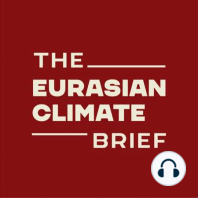33 min listen

Crypto's carbon costs: Eurasia feels the heat
Crypto's carbon costs: Eurasia feels the heat
ratings:
Length:
36 minutes
Released:
Feb 9, 2022
Format:
Podcast episode
Description
On 25 January, Kazakhstan, Kyrgyzstan and Uzbekistan suffered from a mysterious series of electricity power outages, plunging the region into chaos. For several hours, skiers lay perched on lifts and planes grounded while traffic lights, heating district and tap water pumps ran idle. The incident comes after Kazakhstan, the world’s second largest bitcoin producer, faced a similar outage in November 2021. The culprit according to the government? Unregistered cryptocurrency miners.While the exact cause of the 25 January power shortage has yet to be pinpointed, it is now established crypto-mining is piling pressure on the countries’ creaking soviet energy infrastructure.Join us as we discuss the carbon footprint of crypto in Central Asia and the rest of Eurasia. Our reporter Stephen Bland talks to residents and experts about the industry’s impact on Kazakhstan, while Boris Schneider asks economist and campaigner Alex de Vries whether there can ever be such a thing as green crypto-mining.We’ll also be bringing you the latest climate headlines from our region at the end of the episode.This episode is made by:•Natalie Sauer, a French British environmental journalist and MA student in Russian and Post-Soviet Politics at the School of Eastern European and Slavonic Studies, University College London. A former reporter for Climate Home News, her words have also appeared in international media such as Le Monde Diplomatique, Politico Europe, Open Democracy, Euractiv and the Heinrich Böll Foundation.•Boris Schneider, a climate and environment lead at n-ost, a Berlin-based network for cross-border reporting. Boris heads initiatives to boost climate journalism in Central Asia, the Caucasus and Eastern Europe. •Angelina Davydova, an environmental journalist from Russia. Angelina has been writing about climate change in the region for Russian and international media and attending UN climate summits since 2008. She also teaches environmental journalism and environmental and climate policy and communication in a number of universities and regularly organises training for journalists from Eastern Europe, Central Asia and Caucasus on environmental and climate reporting.•Stephen M. Bland is a freelance journalist, award-winning author, researcher and editor specialising in post-Soviet territories. His book on Central Asia, “Does it Yurt?”, was released in 2016, and he is currently putting the finishing touches to a book about the Caucasus.•Production by the www.thepodcastcoach.co.uk
Released:
Feb 9, 2022
Format:
Podcast episode
Titles in the series (32)
We need to talk about forests: an interview with Paola Deda from COP26 by The Eurasian Climate Brief